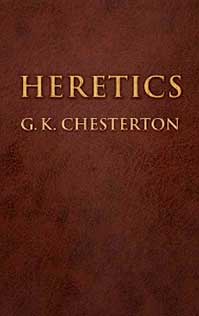Who Was G.K. Chesterton?
Gilbert Keith Chesterton (1874-1936) cannot be summed up in one
sentence. Nor in one paragraph. In fact, in spite of the fine biographies that
have been written of him, he has never been captured between the covers of one
book. But rather than waiting to separate the goats from the sheep, let’s
just come right out and say it: G.K. Chesterton was the best writer of the 20th
century. He said something about everything and he said it better than anybody
else. But he was no mere wordsmith. He was very good at expressing himself, but
more importantly, he had something very good to express. The reason he was the
greatest writer of the 20th century was because he was also the greatest thinker
of the 20th century.
Born in London, Chesterton was educated at St. Paul’s, but never went to
college. He went to art school. In 1900, he was asked to contribute a few
magazine articles on art criticism, and went on to become one of the most
prolific writers of all time. He wrote a hundred books, contributions to 200
more, hundreds of poems, including the epic Ballad of the White Horse, five
plays, five novels, and some two hundred short stories, including a popular
series featuring the priest-detective, Father Brown. In spite of his literary
accomplishments, he considered himself primarily a journalist. He wrote over 4000
newspaper essays, including 30 years worth of weekly columns for the
Illustrated London News,
and 13 years of weekly columns for the Daily News. He also
edited his own newspaper, G.K.’s Weekly. (To put it into perspective, four
thousand essays is the equivalent of writing an essay a day, every day, for 11
years. If you’re not impressed, try it some time. But they have to be good
essays – all of them – as funny as they are serious, and as readable
and rewarding a century after you’ve written them.)
Chesterton was equally at ease with literary and social criticism, history,
politics, economics, philosophy, and theology. His style is unmistakable, always
marked by humility, consistency, paradox, wit, and wonder. His writing remains as
timely and as timeless today as when it first appeared, even though much of it
was published in throw away papers.
This man who composed such profound and perfect lines as “The Christian
ideal has not been tried and found wanting; it has been found difficult and left
untried,” stood 6’4? and weighed about 300 pounds, usually had a
cigar in his mouth, and walked around wearing a cape and a crumpled hat, tiny
glasses pinched to the end of his nose, swordstick in hand, laughter blowing
through his moustache. And usually had no idea where or when his next appointment
was. He did much of his writing in train stations, since he usually missed the
train he was supposed to catch. In one famous anecdote, he wired his wife,
saying, “Am at Market Harborough. Where ought I to be?” His faithful
wife, Frances, attended to all the details of his life, since he continually
proved he had no way of doing it himself. She was later assisted by a secretary,
Dorothy Collins, who became the couple’s surrogate daughter, and went on to
become the writer’s literary executrix, continuing to make his work
available after his death.
Chesterton debated many of the celebrated intellectuals of his time: George
Bernard Shaw, H.G. Wells, Bertrand Russell, Clarence Darrow. According to
contemporary accounts, Chesterton usually emerged as the winner of these
contests, however, the world has immortalized his opponents and forgotten
Chesterton, and now we hear only one side of the argument, and we are enduring
the legacies of socialism, relativism, materialism, and skepticism. Ironically,
all of his opponents regarded Chesterton with the greatest affection. And George
Bernard Shaw said: “The world is not thankful enough for
Chesterton.”

